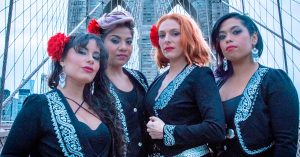
Xavier Hooper
Contributor
[email protected]
Since the dawn of Mariachi, a genre of music which originated in Mexico well over 100 years ago, the idea of “machismo,” or masculine pride, has been embedded in Mariachi culture and has become tradition. According to NPR, “mariachi culture is still mostly about straight men.” (Latino USA, 2015) This idea of masculine pride is a historical issue that persists in nearly all cultures. All-female mariachi group Flor de Toloache feels this burden, according to its members..
“Mariachi is a genre of music that is dominated by man, but the music industry in itself is also dominated by men,” Mireya Ramos, co-founder of Flor de Toloache said. “For example, we get criticized quite often for our pants.Traditionally, women in Mariachi are supposed to wear a skirt with their hair pulled back. There are ‘rules’ like that.”
The traditional Mariachi outfit for men consists of a bowtie, wide-brimmed sombrero, short boots, a waist-length jacket and fitted pants, embroidered with “botonaduras,” traditional Mariachi buttons that go down the pant leg. The group showed up wearing jackets and skinny pants with these botonaduras,jingling with every step, deconstructing the female Mariachi dress code.
According to Mireya Ramos, the typical Mariachi listeners used to listening to songs in the genre made by men.“Most of the songs in Mariachi are written by men, and men only. And the women that listen toMariachi love it that way, as if they were men themselves,” Ramos said. “A group like us, it’s important not only for the genre of Mariachi, but for the world. We represent female independence, we empower other women through the work that we do.”
The group takes on a different approach to by composing original songs from the perspective of a woman. This change in tone appeals to a larger demographic, reaching out to listeners who want to, or would rather listen to Mariachi composed entirely by females, opposed to the typical songs made by men, according to Ramos. Right now, the band is on tour in the U.S., and recently performed at UNC Asheville. The group has also performed in Mexico, where the genre originated, twice.
“The 2 times that we’ve been, we were really nervous because we didn’t know how the audience would react.” The first time the group went to Mexico, they performed in Guadalajara at the “Festival de Mariachi.” “The audience seemed to be very excited to see a group that continues to carry on the tradition and bring it all around the world,” Ramos said.
“This year we went to Mexico City for the first time and we played at “Vive Latino,” which is
the biggest festival there is in the city, we were nervous, obviously, but there were people in the
crowd that knew our songs.”
The group was originally founded in New York by Mireya Ramos and Shae Fiol, both having years of previous experience in other genres of music such as hip hop and jazz. One can see this reflected in the style of music they perform which also implements a diverse cultural background coming from Mexico, Puerto Rico, Dominican Republic, Cuba, Australia, Colombia, Germany,Italy and the U.S. Before the group’s name reached the acclaimed fame and status it’s at right now, band members began performing underground, in the subways of New York City, New York, entertaining the people who traverse throughout the state every day.
“We’ve been playing in the subway for many years. In the beginning of our career, we played in the subway,” Ramos said. “It’s the best position for a group that’s just starting because of all the traffic that it gets.Because of the subway, we got our first article in the New York Daily News, and from there, we were featured in The New York Times and The Wall Street Journal.”
Since then, the band has performed all over the world in Europe, Asia, and the U.S. With hundreds of thousands of listeners on major platforms like Spotify and Apple Music and even featured on Rolling Stone and NPR’s “Tiny Desk,” with 1.8 million views.
“I’d say that we all do it with a little bit of worry, but we still do it, right?”Julie Acosta, one of the group’s trumpet players said. “We keep moving forward in what we want to do without thinking too much about if there’s no opportunity for us. Because that’s something of the mind and if you keep thinking that, you’ll manifest it as well. The opportunities that belong to you will come to you.”
“Transcending Machismo in Mariachi.” NPR, NPR, 19 June 2015, www.npr.org/2015/06/19/415807031/transcending-machismo-in-mariachi.


![Brooke Pedersen [second from the right] and Luis Reyes [right] hold banners during the Wrap The Woods event.](https://thebluebanner.net/wp-content/uploads/2025/09/ELIZABETH_PRITCHITT_IMG_3470-1200x804.jpg)















